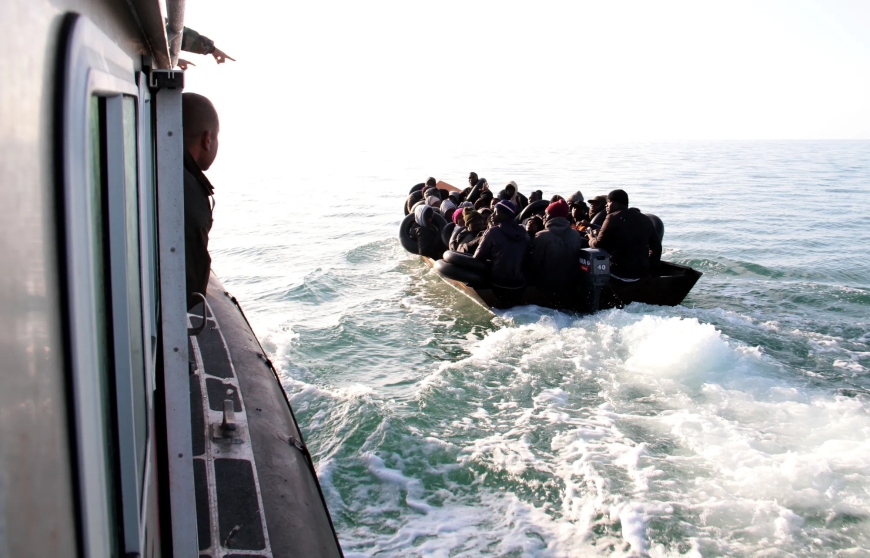Stranded Migrants Face Violence and Despair as Tunisia Partners to Halt European Exodus
In the coastal town of El Amra, the dreams of many migrants from sub-Saharan Africa to reach Europe have turned into a grim nightmare. Nestled in the olive groves of North Africa's Mediterranean coastline, these migrant encampments reflect the severe struggles faced by individuals fleeing war, poverty, climate change, or persecution, now trapped in Tunisia.

Under makeshift shelters of tarps and blankets, men, women, and children endure harsh conditions, hoping for a chance to cross the Mediterranean to Italy. However, they find themselves stuck in Tunisia, unable to continue their journey or return home due to financial constraints.
According to the U.N.’s International Organization for Migration, an estimated 15,000 to 20,000 migrants are stranded in rural areas near the central Tunisian coastline. This situation has intensified due to stringent anti-migration policies in both Tunisia and Europe. Recent gains by right-wing politicians in the European Union's parliamentary elections have further fueled these policies, resulting in the growth of migrant encampments as police push migrants out of urban areas and enhance efforts to prevent Mediterranean crossings.
Escalating Tensions and Violence
Among the stranded is 16-year-old Mory Keita from Ivory Coast, who arrived in Tunisia last year after fleeing his flood-prone suburb. Keita resides in an encampment known as Kilometer-19, notorious for violent clashes between migrant groups segregated by nationality. "Machete brawls" frequently erupt, and police interventions often aim to dismantle the camps rather than ensure safety.
Keita's story is emblematic of many others. After paying smugglers for passage through Mali and Algeria, he attempted to cross the Mediterranean but was intercepted by the Tunisian coast guard and returned to shore without processing. This crackdown, supported by European funds, has seen nearly 53,000 migrants prevented from crossing to Europe between January and May this year.
International Agreements and Local Backlash
The reduction in successful crossings from Tunisia to Italy is viewed as a success by European leaders, particularly after a 1 billion euro ($1.1 billion) accord was struck with Tunisia last year. Despite this, the deal's implementation has been criticized for lack of transparency, with NGOs raising concerns about the use of allocated funds.
As the number of migrants stranded on the Tunisian coastline grows, so does local resentment. Civil society groups and politicians have called for the expulsion of migrants, with some urging residents to form militias to police the areas. The situation has sparked xenophobic rhetoric, echoed in statements by President Kais Saied, who has claimed without evidence that migrants are part of a conspiracy to alter Tunisia's identity.
Human Rights Concerns
The U.N. High Commissioner for Human Rights has expressed alarm over the increasing targeting of migrants and those assisting them, citing rising dehumanizing and racist rhetoric against Black migrants and Tunisians. The Tunisian government, accused of deporting migrants across borders with Libya and Algeria, has acknowledged moving migrants to remote borderlands, raising further human rights concerns.
Future Outlook
Despite the challenges, the EU continues to support Tunisia with development assistance and repatriation programs aimed at limiting migration. European leaders, like Italian Premier Giorgia Meloni, praise the 2023 accord as a model for migration management. However, recent arrests of journalists and activists have prompted the EU to reiterate the importance of freedoms of expression and association.
Majdi Karbai, a former Tunisian parliament member, criticized the EU-Tunisia partnership, arguing it jeopardizes democracy and human rights in Tunisia. He suggests that President Saied uses the migrant crisis to bolster his populist image and secure more European assistance.
As Tunisia navigates its complex role in the regional migration crisis, the plight of stranded migrants continues to highlight the urgent need for comprehensive and humane solutions.
Tags:
- African Union
- crisis
- Sudan
- Africa
- Algeria
- Angola
- Benin
- Botswana
- Burkina Faso
- Burundi
- Cameroon
- Cape Verde
- Central African Republic
- Chad
- Comoros
- Democratic Republic of the Congo
- Djibouti
- Egypt
- Equatorial Guinea
- Eritrea
- Eswatini
- Ethiopia
- Gabon
- Gambia
- Ghana
- Guinea
- Guinea-Bissau
- Ivory Coast
- Kenya
- Lesotho
- Liberia
- Libya
- Madagascar
- Malawi
- Mali
- Mauritania
- Mauritius
- Morocco
- Mozambique
- Namibia
- Niger
- Nigeria
- Republic of the Congo
- Rwanda
- Sao Tome and Principe
- Senegal
- Seychelles
- Sierra Leone
- Somalia
- South Africa
- South Sudan
- Sudan
- Tanzania
- Togo
- Tunisia
- Uganda
- Zambia
- Zimbabwe.













































